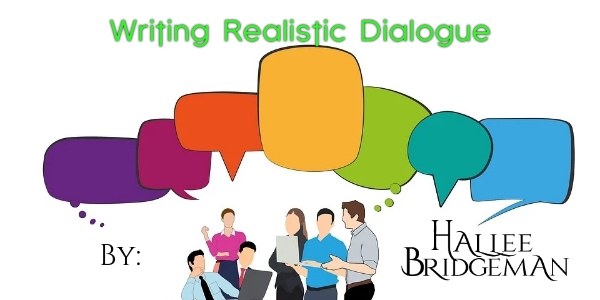by Hallee Bridgeman, @halleeb
I recently judged an unpublished novel contest. I had an array of genres, but one thing that stood out consistently throughout all of them was a lack of realistic dialogue. What makes dialogue not “realistic”?
- The characters don’t say what real people would actually say. I read a book one time that I stopped reading three chapters into it because the dialogue was so unrealistic. A woman who was alone on a ranch went into the barn and found a strange man. She felt threatened and scared. A minute later, he asks her about the history of the property and she launches into a three-page dialogue on how the property came into her late-husband’s possession.
Nothing about that exchange was realistic. - The characters don’t sound like real people. Often, as we’re typing and typing, writing narrative, thoughts, feelings, our dialogue gets lost in the literary process. People speak a certain way, with certain rhythms, and with certain abbreviations. If your characters don’t sound like real people, it’s worth stripping the dialogue and writing it again.
- The story is driven and the plot advanced through the dialogue. In real life, when people talk, they’re not advancing plots. They say what needs to be said in their own personal way of saying it. My husband has a cousin who can make an entire sentence out of the three-syllable way he says, “Well,” in a very eastern Kentucky accent. You never doubt what he means by that word when he says it.
The following example is from the late Elmore Leonard. Leonard was known as a master of dialogue. You would never read one of his books and expect to find something like this farcical example.
In the following scene, two criminals, Bill and Marty, are planning a bank heist. Marty is a two time loser and a hardened criminal with a penchant for violence. Bill is socially awkward, and rather a weak man, but he is able to open the safe.
Bill asked Marty, “But why do we have to be there before lunch? Can’t we just eat lunch then go?
Marty answered, “Are you actually the dumbest bank robber alive? We have to go there before lunch for three reasons. First, because the vault is on a timer. Second, because the armored car arrives between noon and one so if we go in the afternoon, the vault will be empty. Third, our contact at the alarm company can only disable the alarm for a short amount of time. If we don’t get in and get back out before lunch, we need not even do this!”

As you can see, the answer I supplied for Marty here is very, very on the nose. It is also well out of character for two-time loser and general tough guy, Marty. Elmore actually wrote the dialogue in that scene like this:
Bill asked Marty, “But why do we have to be there before lunch? Can’t we just eat lunch then go?
“Shut up,” Marty explained.
- Men talk too much and/or women don’t talk enough. In real life, men talk an average of 7,000 words per day. Women talk an average of 20,000 words per day. If you are a female writer and your male characters talk as much as the female characters, you might want to have your manuscript looked over by a male writer who can help you make the dialogue more realistic. If your female characters typically have three-syllable sentences with the word, “Well,” then you might need to expand their vocabulary some.
How can you make your dialogue more realistic? The best way is to read it out loud. When you hear something, you process with a different part of your brain that reading it silently. You will pick up on most of the problems that way. You just have to be willing to hear them.
John Steinbeck once said, “If you’re using dialogue, say it aloud as you write it. Only then will it have the sound of speech.”
A better way is to read it out loud to someone else, or let that person read it out loud to you. Then you’re just listening and processing and will catch dialogue issues that you never would have before.
Stripped of everything, Alex comes to Jon for help, and only then does she learn her true value. Jon falls very quickly in love with Alex’s zest for life and her perspective of the the world around her. He steps off of his path to be with her. When forces move against them and rip them apart, he wants to believe God will bring them back together, but it might take a miracle.

With nearly a million sales, Hallee Bridgeman is a best-selling Christian author who writes action-packed romantic suspense focusing on realistic characters who face real-world problems. Her work has been described as everything from refreshing to heart-stopping exciting and edgy. Hallee has served as the Director of the Kentucky Christian Writers Conference, President of the Faith-Hope-Love chapter of the Romance Writers of America, is a member of the American Christian Fiction Writers (ACFW), the American Christian Writers (ACW), and Novelists, Inc. (NINC). An accomplished speaker, Hallee has taught and inspired writers around the globe, from Sydney, Australia, to Dallas, Texas, to Portland, Oregon, to Washington, D.C., and all places in between. Hallee loves coffee, campy action movies, and regular date nights with her husband. Above all else, she loves God with all of her heart, soul, mind, and strength; has been redeemed by the blood of Christ; and relies on the presence of the Holy Spirit to guide her.

